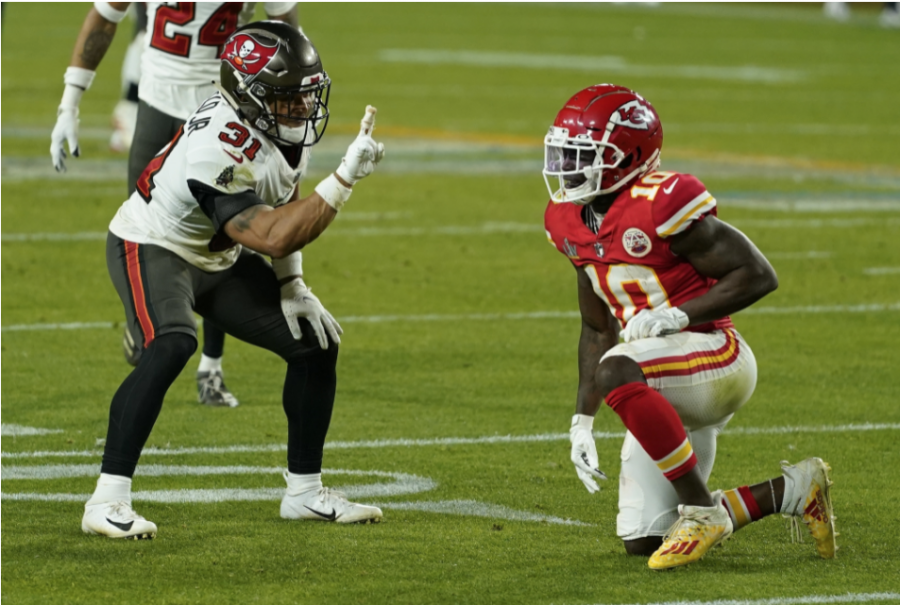Taunting Penalties in the NFL
October 6, 2021
There has been no shortage of nail biters this NFL season in just the first two weeks. MVP front-runners Derek Carr and Kyler Murray have been lighting up the league in some shocking prime time games, including the best game of the season so far, a Ravens-Raiders Monday night high scoring thriller. We’ve been treated to a season opening shootout between the Bucs and Cowboys, a Browns-Chiefs divisional round rematch, a Thursday-night winning field goal by Washington kicker Dustin Hopkins against the Giants, a three touchdown overtime win for Derrick Henry and the Titans over Russell Wilson, and Lamar’s first victory against the Chiefs in a 35-36 game on Sunday Night. And of course, it wouldn’t be the NFL without the Vikings finding new ways to lose extremely close games to the Bengals and Cardinals. Amongst the many touchdowns and NFL fans hyped for the return of the league, however, there is one dark spot that has taken the center of attention: a crackdown on taunting.
Recently, the NFL has been dubbed “the No Fun League” by its fans for Roger Goodell’s crackdown on celebrations and taunting, including fining Alvin Kamara $5,000 for his colorful cleats after he tied the NFL record with 6 touchdowns against the Vikings on Christmas day. What started out as a nickname has quickly come true this year, with referees leaving fans frustrated after fining players for even the smallest of celebrations. After muscling his way through six Carolina defenders, Colts up-and-comer RB Benny Lamay was fined $3,667 for “flexing” post-whistle. Lamay was competing for a spot in a talented Colts running back room consisting of Johnathan Talor, Marlon Mack and Neheim Hines, and the fine equaled half of his preseason check.
Eleven penalties have already been dished out in the regular season, each with a hefty price tag. In 2020, only eleven taunting penalties were thrown in the entire season, so what’s the reason for the sharp uptick? The answer: a lackluster attempt to increase sportsmanship. The mental aspect of taunting has become a part of player strategy now, with trash-talking corners like Jalen Ramsey sometimes doing more work in the heads of players than on the field. We’ve seen run-of-the-mill celebrations like a ball spin by Jordan Akins and a simple “incomplete” hand signal by Levi Wallace get flagged for taunting. But for players and fans alike, the biggest downside isn’t the flagging, it’s the inconsistency.
Last year, we saw the battle between Tyreek Hill and Antoine Winfeild Jr. in both the regular season and the Super Bowl. In their first matchup, Tyreek abused the Bucs secondary, with over 240 receiving yards and two touchdowns in just the first quarter. On his way into the endzone for the second time on the day, Tyreek Hill flashed up a “two” to Winfeild. Afterwards, he went on the sideline and used the team phone to reenact Shannon Sharpe’s famous skit of calling the national guard. There was no flag thrown and everyone but Bucs fans enjoyed the spectacle and jab at Winfield. But the corner was out for revenge, and Winfeild shut down Tyreek in the Super Bowl, including forcing the game sealing incompletion while in coverage on Hill. After the play he held up the same “two” Tyreek had done several weeks back, and was flagged 15 yards (See picture below). So why was this motion called but Tyreek’s, despite having the same intention and severity? What many fans are wondering is why cherished player rivalries are turning into penalties. It seems that nowadays, every play ends with a flag on the field, leading to general annoyance from spectators. The NFL’s justification came in a statement in early August: “we saw an increase in actions that clearly are not within the spirit and intent of this rule and not representative of the respect to opponents and others on the field.” Even after the harsh criticism this season, they doubled down on the decision and stated that, post-review, 9 out of the 11 taunting calls were correct.
On the other hand, NFL team owners and coaches like Washington head coach Ron Rivera and Giants CEO John Mara agree with the added penalties, with both expressing their concerns in players fighting. The NFL has claimed several times that they are not trying to keep players from having fun, and while there is a fine line between celebration and aggression, the general consensus from the players and fanbase is that the rules take away the enjoyment of the game, and unfortunately, it seems that they are here to stay.







